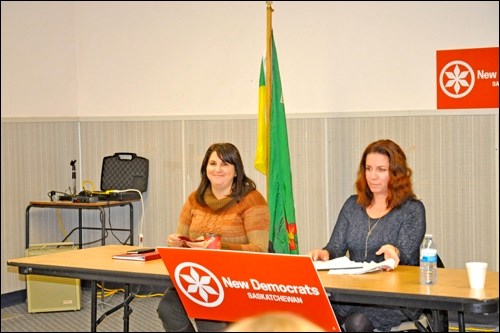The NDP critics for health, social services and education were in North Battleford Friday for a town hall meeting on the state of health care in the province before the government releases its latest budget.
MLA for Saskatoon Riversdale and critic for health Danielle Chartier, MLA for Prince Albert Northcote and critic for social services Nicole Rancourt and MLA for Regina Lakeview and critic for education Carla Beck spoke with residents — many who attended are health care workers or rely on health services in some way — about their concerns and the issues they see that need to be addressed by government.
The first issue raised was from a candidate for North Battleford city council, Kent Lindgren, who, as HIV co-ordinator for Battlefords Family Health Centre, discussed the prevalence of HIV infection in Saskatchewan, particularly among poor and indigenous populations.
In September of this year a group of Saskatchewan doctors called for the provincial government to declare a public health state of emergency regarding the rising rates of HIV and AIDS. In Saskatchewan the rate of HIV infection is two times higher than the national average and, according to people like Lindgren, the provincial government’s strategy to address the epidemic has been inadequate in getting ahead of the problem.
“I think HIV is emblematic of other health issues and how lack of services and strategies really shows health disparities,” said Lindgren at the meeting. “We’re seeing what happens when you don’t invest and work at it.”
Another issue affecting residents was raised by Chartier, who asked attendees their opinion of the new Saskatchewan Hospital, particularly relating to the proposal from the CEO of the health region, David Fan, to place a tax levy on local residents to cover the cost of furnishing and equipping the provincial hospital. Many in attendance said they felt the proposal was misguided, but noted that they didn’t believe the levy would pass.
The new Saskatchewan Hospital was planned with a “P3 procurement process,” which means funds were also raised through the private sector. Chartier noted the estimated yearly cost of maintenance on the new structure is $6 million, which will go to a UK company, while the current maintenance cost of the entire health region is only $4 million.
And one topic that seemed to underscore the other comments made during the discussion was the expected announcement about amalgamation of health regions. Earlier this year on Aug. 18 the government appointed a three-person panel whose mandate is to oversee the current structure in order to eke out a system with fewer regional health authorities. One attendee from Regina, who works in the health field, shared that he worried about the costs that would fall back on the individual in the form of travelling costs and time to get to a specialist if health regions were restructured and centralized.
While it’s still early days and the advisory panel has not announced their restructuring plan, Rancourt said these meetings were planned because “we want to talk to the residents in these communities and see what they (think) the needs are in health care. We know right now there’s going to be a lot of changes,” she added alluding to the upcoming budget announcement, “and we feel it’s important to hear firsthand what residents in these communities want to see, where they see their barriers and where they want to see public healthcare go in the future” said Rancourt. “Our position and our job is to advocate for the people.”




